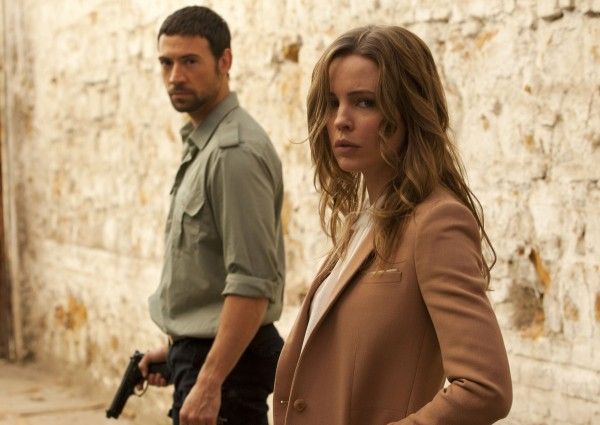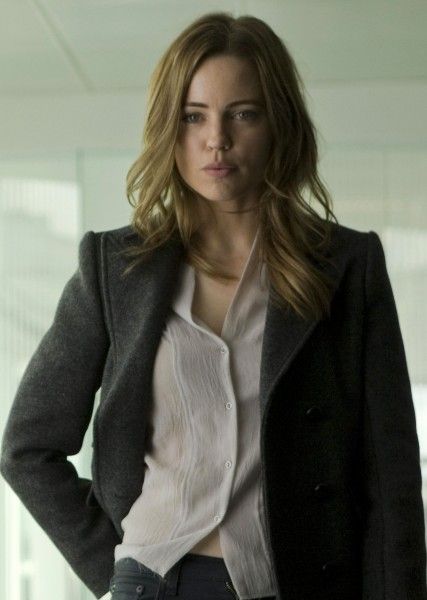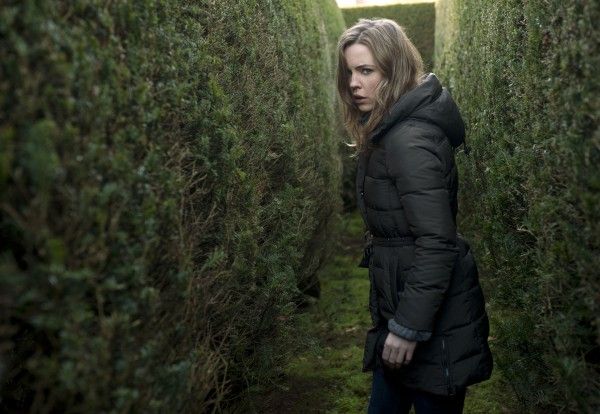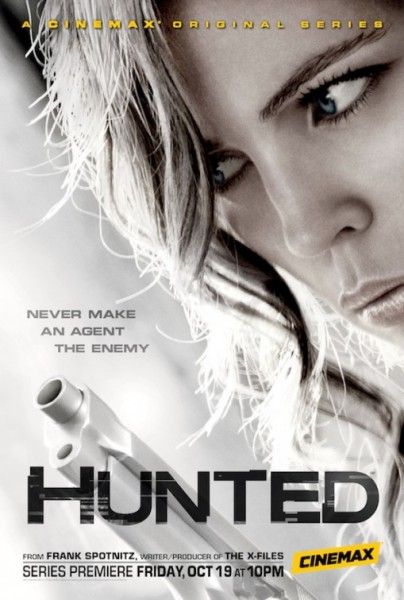From The X-Files writer/producer Frank Spotnitz comes the eight-episode drama Hunted, set in the world of international espionage. Sam Hunter (Melissa George) is an operative for an elite private intelligence firm called Byzantium, who survives an attempt on her life that may have been orchestrated by members of her own team. When she returns to work, she doesn’t know who to trust, but is determined to do whatever it takes to get answers. Shot entirely on location in Morocco, Scotland and London, the show also stars Adam Rayner, Stephen Dillane, Adewale Akinnuoye-Agbaje, Morven Christie and Lex Shrapnel.
During this recent exclusive interview with Collider, Frank Spotnitz talked about how Hunted evolved into a series, where the concept started, the importance of making and keeping things believable, how exciting it was to work in the U.K. with such an international cast, the biggest challenges of doing a show on this scale, and how many questions they’ll answer by the end of the season. He also talked about having a number of projects, locked away in a drawer, that he’d love to do someday, and what he enjoys about the storytelling for television versus film. Check out what he had to say after the jump.
Collider: How did Hunted come about?
FRANK SPOTNITZ: Well, Stephen Garrett and Jane Featherstone, the heads of Kudos Film and TV in London, had come to L.A. in 2002 and met with me. They said, “Would you ever want to do a TV show in London?,” and I said, “Yeah, I would love to! That would be great!” I lived in Paris in my 20's and wanted to go back to Europe, but didn’t know how that was going to happen. And they just never stopped calling. Every year, Stephen Garrett would call me and say, “You got anything? You wanna come to London?” Finally, in 2009, I thought, “I think I can do a show in London.” The business had changed so much. The types of shows you could do on television had become much wider, so I thought I could do it. So, I called him and said, “I think I have an idea.” That was early 2009, in the spring. By January 2010, I had the script, and I moved to London in June of that year. It took awhile to get to this point, but it was a deliberate plan to get across the Atlantic.
Where did the concept start?
SPOTNITZ: I think it was the spy genre, which I love. It’s my favorite thing. I just thought, “Americans will watch British people, if they’re spies.” We grew up with that, with James Bond and John le Carré movies, so we accept that. But then, it became, “What do I do that’s different?,” because there had been so many amazing ones. I thought about Jason Bourne, but I didn’t want to make it a man. I wanted it to be a woman. I thought it was more interesting to subvert your expectations. She’s an underdog, just by being a woman in a man’s business. So, I thought, “If you were a female Jason Bourne, what would you really be like in real life.” It was going to be a character-based TV series, and I figured that she probably wouldn’t be very nice. She kills people, so she’d probably be pretty cold and unapproachable. Then, I thought, “Well, how did she get that way? What made her that type of cold, remote, unapproachable person, willing to kill other people? Probably some really bad things happened to her, in her life.” That was my way into her character, and it became the center of the show. She is this cold, manipulative spy who kills people, but terrible things happened to her, as a little girl. That’s a way in for the audience, emotionally, and it’s something that I can relate to. For all of us, there are things in our past that we wish hadn’t happened. The question for Sam, and all of us, is, “Are we defined by our past, or can we overcome it and determine what our future is going to be?” That’s what the series is about. It’s a spy show, and all that, but really, that’s what it’s about.
Was Sam always as believable as she is now, or did that come with casting Melissa George?
SPOTNITZ: I wanted it to feel real and not silly. I feel like we’ve got to an extreme. The technology has become over-the-top, and I like at it and go, “That’s bullshit. I don’t believe it.” And I wanted to believe this was real. And then, working on it with Kudos and S.J. Clarkson, the woman who directed the first two episodes, they also wanted to make it feel as real as we could. We didn’t want to have her make-up too perfect or her hair too perfect or her clothes too perfect, and we took out some gadgets that were too far. They were real, but they just didn’t feel real. If the audience isn’t going to believe it, we take it out, and that makes it easier to engage with the story because it gives the show credibility. Melissa has that physicality, and then she trained really hard. Everything she does, a woman of her height and weight could do, in real life. That was our threshold for what the action sequences and stunts should be. And then, the other thing that S.J. brought to the first two episodes, that continued throughout, is that you can sense when she’s in pain and she’s upset. She gets attacked by those three men in the café and you can see that she’s really upset. I don’t see that, usually. I love Bond and Bourne, but they don’t usually seem that distraught. But, that’s a real person and a real reaction. In other fights, you can see that she’s exhausted and she’s in pain. I thought that made it more powerful than if she’d been some superwoman.
Was it fun for you to have such an international cast who will be new to many of the viewers?
SPOTNITZ: For me, that’s what’s so exciting, as an American, to go to the United Kingdom and be able to shoot this beautiful country and these amazing locations. It’s ridiculous! There’s so much great stuff that you can’t possibly put it all in. It’s absurd how beautiful it is and how many amazing cinematic things there are. And then, the actors in Britain are incredible, and I didn’t appreciate that until I got there. They interpret your words and you realize how deliberate and thoughtful they are, with the way they approach every line. There are great American actors, too, don’t get me wrong, but the technique that British actors have is something really special.
With so many interesting relationships on this show, did you find any of them most fun to explore?
SPOTNITZ: I say to writers that I work with, “We have to love this. We have to love this so much, if we want other people to like it, at all.” So, I love everybody. All of these characters mean a lot to me. I couldn’t make it good at all, unless they really moved me. I like them all. The fun thing, for me, was that it was always a relief when I got to write Zoe (Morven Christie) and Fowkes (Lex Shrapnel), the Scottish girl and the new guy on the team. I just like his sweetness, and I like how mean she is to him. I can tell she likes him, even though she’s mean to him. That was some humor and lightness amidst a lot of tension, all the time. But, I’m very moved by these characters, so it would be hard to say if there was one I liked the best.
What are the biggest challenges in doing a show like this?
SPOTNITZ: It’s really, really hard and really challenging. Kudos get a lot of credit for taking on the challenge and spending the money to do it the right way ‘cause it was not easy, but it shows. I just think you have to have that level of ambition, if you want to achieve something great, and we had that level of ambition. You’re having to move around constantly, and that takes time and money. It’s a lot easier to just park yourself in a soundstage and shoot it all there. But especially when you want people to buy into this make-believe world, when you see the real world around, without even thinking about it, it just feels real. You really see London throughout the show, in a way I think people rarely do. So, it was worth the effort.
On this show, you raise so many questions, throughout the season. Were you always thinking about answering those questions by the end of the season, or did you want to leave some open, for a possible Season 2?
SPOTNITZ: Absolutely! I learned a lot, doing The X-Files particularly, about mythology and extended storylines. I’ve come to conclusions about what works and what doesn’t work, and what I can do better and what I can do worse. I wanted this to be a series that moved fast and that had twists and turns, and that didn’t just tease you and tease you and tease you, so a lot happens. It’s packed with things and you have to pay attention or you’re going to miss stuff, but that’s fun. I knew the heart of it was Sam’s emotional journey. That’s always at the center of the story. It’s always about, “Where is Sam? How is she affected this week? Where is that story going?” There’s a lot that gets wrapped up in Episode 8, so there’s a lot of narrative satisfaction for the viewer. Even questions you never would have expected to be answered, get answered in Episode 8. But then, there is a longer journey that her character is on that doesn’t get resolved, and I don’t think you’d want to see it get resolved. It wouldn’t feel real. So, that’s the line that continues, for however long the show goes on.
Do you have another dream project, tucked away in a drawer somewhere, that you’re hoping to get to do?
SPOTNITZ: Yes! I have so many things that I want to do, and I don’t have enough time in my life to do them all. The problem with this business is that it’s so expensive and you’ve got to get so many people to say yes. I’ve got tons of things I want to do, but you have to treasure [what you do get to do]. Ultimately, it’s about reaching an audience and having them respond to what you’ve done. I’m just really happy that we’ve gotten to this point with Hunted, and I hope we can keep doing it for quite awhile.
Are those other projects things of a similar genre?
SPOTNITZ: No, they’re all different. I have science fiction things. I have a medical show. To me, they’re all stuff that nobody’s done, that I’d like to see. I like stuff that is entertaining, where I’m emotionally engaged and there’s something to think about afterwards. I don’t like television and movies where it’s like, “Well, that was entertaining, but when I think back on it, that didn’t really make sense and it’s empty.” That’s like junk food, to me. I love stuff where I’m looking around the world a little different now that I’ve seen that. I want something that nourishes my view of the world. It sounds corny, but I think people need stories to process the world. That’s our business. That’s the job we’re in. We tell stories. So, let’s make them really good stories that people get something out of. That’s the one common denominator with everything I try to do.
As a storyteller, what do you enjoy about the longer form of television versus telling a self-contained story in film? Do you prefer having more time to explore the characters and story?
SPOTNITZ: You know, I think there’s something to be said for both. The beauty of a really good movie is that it’s a whole world, complete in an hour and a half or two hours. When I sit down, I find that it’s much easier for me to want to consume a movie than to dip back into 20 or 40 or 60 hours of a television series. I think a great movie is really amazing. I can’t even count how many movies have been profoundly important to me. But, television does give you this larger canvas. And especially now, there’s a freedom in television to do things that you couldn’t do, even five years ago. Hunted is an example of that. This is a narrative form that I haven’t tried before, and it’s exciting and interesting. I’m trying to take advantage of that and squeeze every bit of the ideas and emotional engagement out of this new way of doing things that I can. There are all kinds of different forms, and they all have their pluses and minuses.
Hunted airs on Friday nights on Cinemax.




